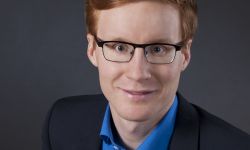
Andreas Elben from the research group of Peter Zoller receives the IQOQI Thesis Prize 2020. The award, which is endowed with 1,000 euros, is being presented for the seventh time this year and honors scientifically outstanding achievements in the field of quantum physics. The prize will be awarded today during a online ceremony.
Nowadays, strongly correlated quantum many-body systems can be realized and controlled in the laboratory based on single atoms, ions or even in solids. In my dissertation, Andreas Elben has developed a new class of measurement techniques to study such quantum many-body systems in a novel way, beyond standard observables, and to verify that they work as desired. This class of measurement techniques is based on 'random measurements', chosen at random from a set of possible operations and performed on the system. „I have used mathematical methods from quantum information theory to evaluate the results of many such random measurements and learn from their correlations about previously inaccessible properties of the quantum many-body system”, says Andreas Elben. „Building on this, I then proposed concrete experimental measurement procedures that have partly already been successfully realized in IQOQI collaborations of the groups of Peter Zoller, Christian Roos, and Rainer Blatt in trapped ion quantum simulation experiments.“ Examples of such measurement procedures include entanglement measurement, comparative verification of different quantum many-body experiments, investigation of quantum chaos by time-disordered correlation functions, and measurements of topological properties.
Award for outstanding achievements
The Thesis Prize is awarded to promising young physicists at the Institute of Quantum Optics and Quantum Information (IQOQI) in Innsbruck for their exceptional achievements. The IQOQI Thesis Prize is endowed with a prize money of 1,000 euros and is awarded to graduates of PhD or doctoral studies at the University of Innsbruck who have achieved scientific excellence in the field of quantum physics. Previous award winners are Philipp Schindler and Simon Stellmer (2013), Alexander Glätzle (2014), Albert Frisch (2015), Florian Meinert (2016) and Petar Jurcevic (2018) and Simon Baier (2019).
Profile
Andreas Elben was born in 1988 in Villingen-Schwenningen, Germany, and studied physics at the Universities of Konstanz, Reykjavik and Heidelberg. Since 2016, he has been conducting research in the group of Peter Zoller at the Institute of Quantum Optics and Quantum Information in Innsbruck and completed his PhD studies at the University of Innsbruck in 2020. He will soon join John Preskill's group at Caltech as a PostDoc.